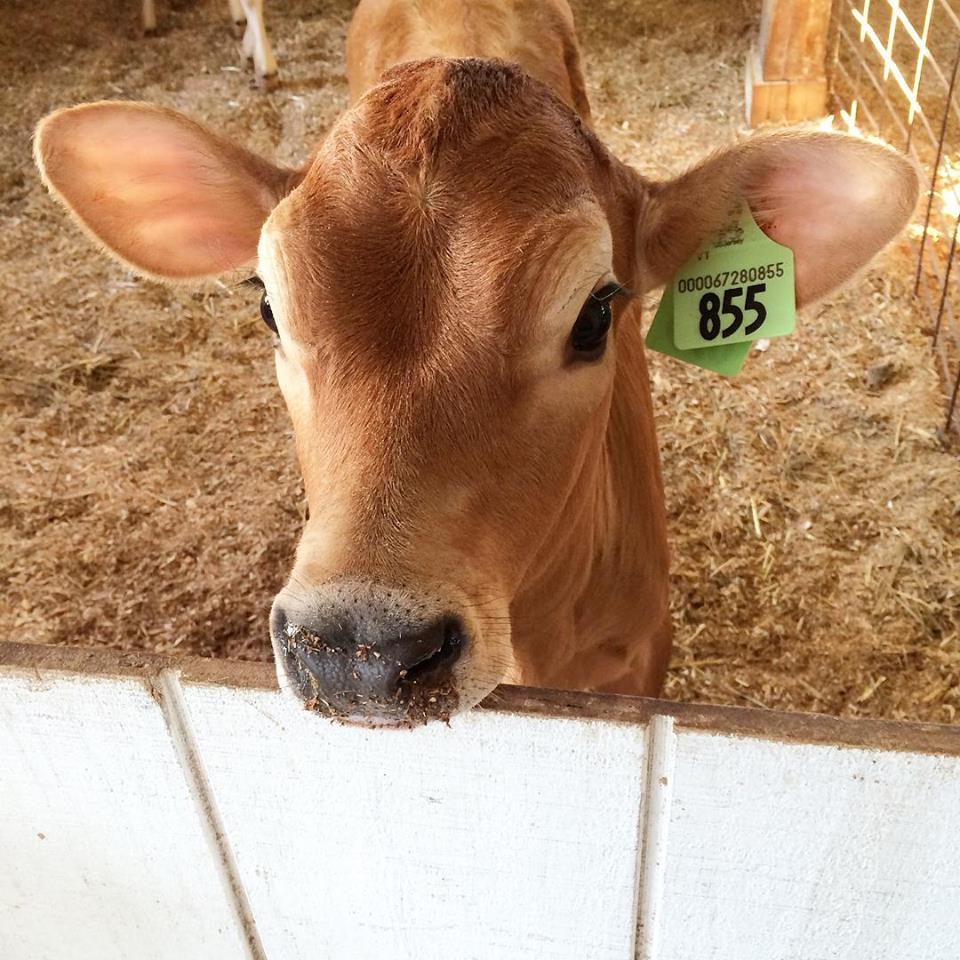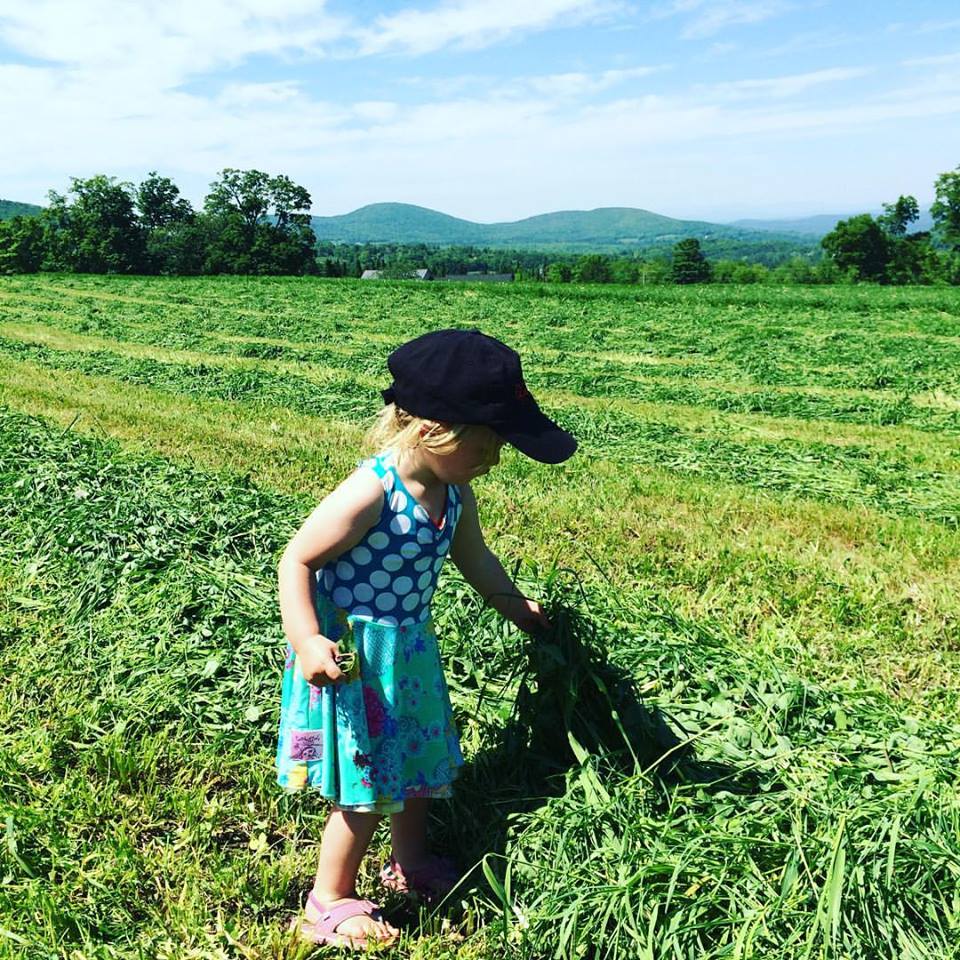
About Molly Brook Farm
Our family farm is named after Molly’s Brook which winds its way through our scenic pastures, fields and sugar-bush. Myles Goodrich and his wife Rhonda, own and operate the 565-acre dairy farm. Myles, is seventh-generation descendant of Amos Whittlesy Abbott and Betsey Knight Abbott who lived on the original farm in 1835. The farm produces organic Jersey milk and sells quality Registered Jerseys.
Near the end of World War I, cattle were selling high and a dealer wanted to buy the Jersey herd. Myles grandparents, Wendell and Inez (Abbott) Goodrich (5th generation), put a price so high on the herd that they never thought they would sell but they did. They replaced the herd with registered Jerseys. Descendants of those cows purchased around 1917 are still on the farm today.
Jerseys have always grazed the pastures. Jersey milk is rich with butterfat, protein and other micro nutrients. Jerseys are able to capture the energy they eat over and above their body weight and put it into milk. Jerseys are an efficient little cow.
Each of our beautiful Jerseys has a name and a personality. Some even have nick names. Occasionally, we give them the perfect name such as Pretty. She is a little first calf heifer who is exceptionally beautiful.
In 2013, Myles bought his parents partnership interest in the farm and soon after transitioned the dairy to organic and started shipping organic milk to Stonyfield on January 1, 2018. Molly Brook milks about 70 registered organic Jerseys.
To transition, the cows must eat organic feed which is expensive for one year but their milk is not organic so it must be sold on the conventional milk market for less than it costs to produce. With Stonyfield’s help we found a path forward so that we could continue farming. I wonder when Gary Hirshberg started Stonyfield all those years ago if he could have imagined how his company would so greatly impact a family farm like ours. Selling organic Jersey milk to Stonyfield saved our dairy farm.
We raise each of our cows from birth. Each cow calves in a clean pen with fresh sawdust and organic straw. Jerseys are very smart sometimes too smart. A common problem is not leaving the milking parlor after being milked and stopping to harass a cow who is being milked. It is not unusual to hear, “Flirt get out of here”. They seem to know their name and stop immediately like children looking for attention.
Our cows are friendly and curious. They all stop whatever they are doing to watch, like when you clean their water tub or are working on something within their sight.
Our cows love to graze, after milking in the morning and at night they are at the gate waiting for us to let them out so that they can go to pasture.


Our young grandchildren, the ninth generation, love working on the farm. Granddaughter, Addie, has been on the farm since she was 2 weeks old. At that point we had four generations working together on the farm. Myles parents, Walter and Sally Goodrich (6th generation) remained active on the farm well into their 80’s.
From our small hillside farm in Cabot Vermont around 1980, the sale of quality Jerseys from outstanding cow families became a focal point of the dairy. The Jerseys Myles parents raised at Molly Brook brought international recognition to the farm that started with a cow named Molly Brook Fascinator Flower. Flower consistently put her stamp on her offspring. Descendants of Flower can be found on dairy farms in Denmark, England, New Zealand, Australia, South Africa, Indonesia, Uruguay, Guatemala, Brazil, Japan, Canada and all across the United States.
Molly Brook has a distinguished dairy history and over the many generations have received numerous awards and recognitions for contributions to the Jersey breed and farming in the Vermont for almost two centuries.
We have documents from as early as the mid 1700’s, letters from family serving in the civil war, and many journals. In 1847, another unknown journal author writes “There was one rule come hell or high water. You must hang onto the rope when leading calves. I led a calf today. It let out a blat, kicked it’s heals and started to run. I lost my balance but held on to the rope. Flat on my belly went through the manure in the gutter until Dad rescued me. I never heard him laugh any harder. He picked me up and helped me to the house. Mother didn’t see anything funny about it.”

From rural electrification and the introduction of the internal combustion engine to the impacts of a global milk market, the farm and the family have weathered a number of changes and challenges over the last two centuries. Small farms like ours have been disappearing from the rural landscape and the problem continues to get worse.
We work 7 days a week and the work can be hard and exhausting. Our farms resilience has relied on the ability to evolve with every new era in farming for the better part of 200 years. Myles says it best, “It’s a challenge to make everything work together but also rewarding to have a healthy herd of productive Jerseys, fertile land, and to work with family.”
Our role as stewards of the 565-acres that make up Molly Brook Farm is one we take seriously. One of the first changes we made when we started our organic transition was to downsize the herd from 120 milking cows to 70 which greatly decreased the amount of manure produced by the animals as well as less stress on our facilities and land. The cows harvest their own feed as well as fertilize the land during the Vermont pasture season. These changes decreased the amount of fossil fuel that our tractors use. We work outside 365 days a year and experience the effects of climate change so it is important to us, that we do our part.
We have 349 acres of forest that is managed by a forester to help us offset our carbon footprint. It is important to manage our natural resources thoughtfully and efficiently.
Myles father always said nobody ever made enough money to leave but in truth it is a love of the land and the animals that keep a family in one place for almost 200 years. The future of Molly Brook is promising.